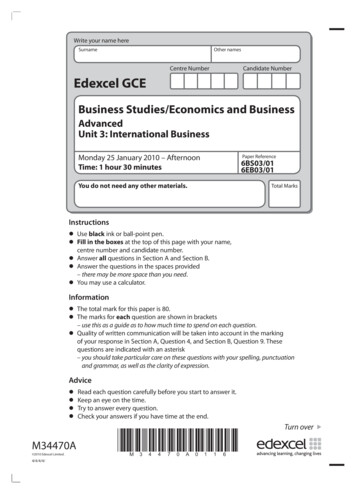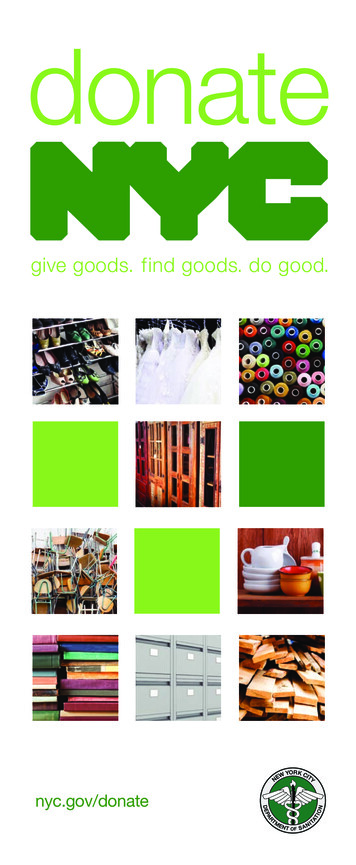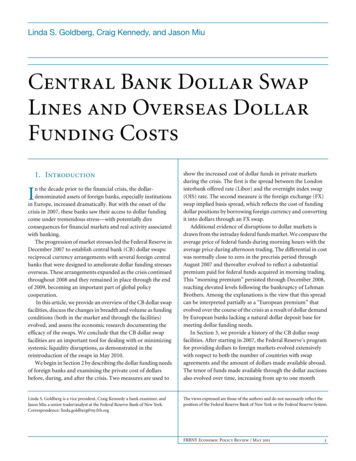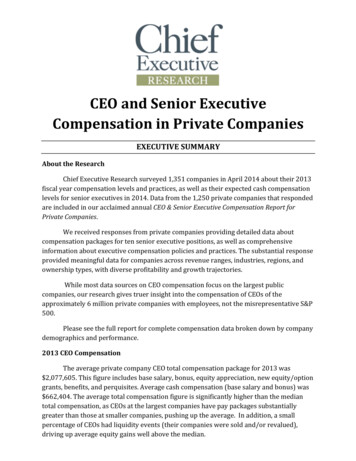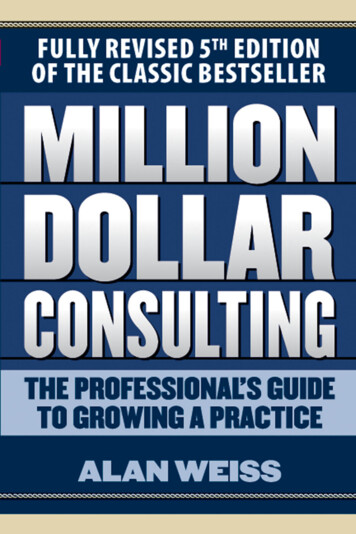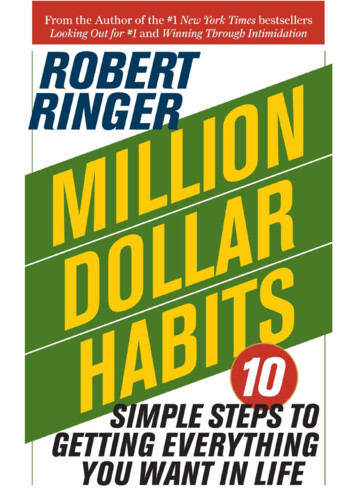
Transcription
The Million DollarReal Estate Marketing Playbook
Table of ContentsIntroduction 1Building a Long-Term Business Plan 2Putting the Right Tools and Resources in Place 5Outlining Your Marketing Strategy 8Stepping Up Your Sales and Outreach 14i
IntroductionThe path to becoming a high-earning real estate professional is different for every agent.While the marketing tactics, sales techniques, and industry technology most agentsand brokers use to grow their careers and earn that first 1 million are mostly the same,the approach each one takes with those tools, resources, and strategies is unique to theirlocation, strengths, and skill sets.One agent may find volume business out in the suburbs to be their most successful routeto raking in the big bucks. Another agent may identify vacation properties as the mostlucrative segment of their local or regional housing market.The point is this: Each real estate pro has a specific formula for success that worksjust for them. By all means, take a look at the blueprints that other agents have builtfor themselves . . . but remember: You still need to build your own! Don’t worry: We’ll helpyou every step of the way.In this ebook you’ll find insights, information, and advice that can help beginners builda solid foundation for success — and seasoned real estate pros take their sales to the nextlevel. If you’re looking to expand your market footprint, scale your business, and earnthe big dollars, you’ve come to the right place.Introduction1
Building a Long-TermBusiness PlanThe first step on the path to your first 1 million is defining your short- and long-termbusiness goals. What does success look like in one month, six months, a year, and beyond?As Brian Buffini, the head of real estate coaching and training firm Buffini & Companyshared in an article for Inman News:“Planning helps you focus your time and energy on the activities thatare essential to achieving your goals, which allows you to prioritize yourday. Instead of working harder . . . you’re working smarter.”This ebook contains a lot of marketing tactics for growing your business. It’s importantto think critically about whether each one will deliver a return on your investment (time,money, or both).As you read through the chapters and identify which activities you want to try, ask yourselfa couple key questions:1. Will there be enough data to prove the activity helped my business grow in some way?If you find that these tactics and techniques help boost at least one key marketing metric (suchas pageviews and sessions on your website; fans, followers, likes, and shares on social media),then it’s worth continuing.2. Will I eventually need to hire others and/or get new technologies to handle this activity?Whether it’s managing leads in your CRM database or nurturing prospects using automatedemail campaigns, chances are you’ll need some help down the line to run everything efficiently— but only you will know whether you can handle these tasks yourself versus hiring freelanceor in-house help.Looking critically at whether your marketing activities are worth your time isn’t justimportant when you’re putting together a business plan; it’s something you should2
be doing every few months, for the length of your career. That’s how top producers stayon top. Speaking of which . . .Forecasting the Next Year (and Beyond)Million-dollar agents don’t land big commissions by accident. They’re successful becausethey plan and pay attention to every last detail — from market share owned, leadsgenerated, and deals closed to net income earned.Let’s examine each of these real estate success metrics more closely: Market Share: Claiming a substantial portion of your market starts with substantial promotionof your brand: both online (your real estate website, social channels, and paid ads) and offline(targeted mailers, monthly or quarterly magazines, billboard ads). If you’re just startingout as an agent or looking to drive more business as an established real estate professional,you’ll want to begin by getting your face and name out there. Lead Generation: Referrals still make up many top producers’ leads today. Once your sphereof influence has been tapped through direct outreach, you can turn your attention to onlineleads. A search-optimized, regularly updated agency website — featuring educational content,the best listings around town, and custom lead capture forms to secure visitors’ contact info —is your best bet for attracting cream-of-the-crop prospects. Closed Deals: Notice how we haven’t even gotten to the reason you signed up for this gig?It’s sink or swim for many agents at the start of their careers. While building a business planfor your agency will help you succeed years down the line, you still need to balance yourmarketing activities with your actual day-to-day job (closing home buyers and sellers). Alongwith being an indicator of success, closed deals will provide you with social proof that can helpyou boost your sales for years to come. Net Income: It’s not just about the quantity of deals closed, but also the quality. Manyearly-career agents (mostly on the buyer’s side) go for volume, but you should be thinkingbigger with your agency. Don’t be afraid to aim for the big-fish clients who want to buyor sell high-end properties; these sizable commissions can help your business truly take off,and it’s easier to keep track of a few large deals than many small ones.Tracking how your marketing activities contribute to your lead gen, sales, and revenuegoals is the key to understanding where to increase your time and money investments —and knowing when it’s time to try other tactics.What is a contacts database?3
The Essential Tech ToolsEvery Top Producer Uses Today#1: R esponsive Real Estate WebsiteEnsure you have a beautiful, mobile-friendly site that integrates with IDX.#2: C RM Lead Management SystemSecure a CRM database that helps you add, organize, and prioritize leads.#3: C omparative Market Analysis ToolFind a CMA resource that allows you to visually compare local listings.#4: Open House Lead Capture AppDownload an app that helps you collect contact information from walk-ins.#5: L isting Presentation SoftwareMake your listing presentations pop by using an intuitive design program.#6: C ustomer Satisfaction PlatformSend surveys to your clients to record their happiness with your business.#7: Online Advertising SolutionDevelop targeted, paid advertising campaigns to earn quality prospects.#8: C ontent Management SystemWrite, edit, and publish your site content from a modern, easy-to-use CMS.#9: T ransaction Management SoftwareKeep track of your closed deals, net income, and other fiscal metrics.#10: M arketing Analytics PlatformMeasure the performance of your site pages using up-to-the-minute data.4
Putting the Right Toolsand Resources in PlaceBefore you start picking a tool (or several tools) to help you track your marketing activities,you should have the five Ws figured out: Who: “The core people needed to complete all of my objectives include myself and .” What: “To meet our goals and grow the business, I am/we are going to accomplish .” When: “ I/we plan to achieve the objectives that will help me/us earn more money by .” Where: “ To convert more business, we need to have a strong marketing presence on .” Why: “ The reason we will execute our business, marketing, and sales plans like this is .”Then you can focus on the devices, software, apps, and other real estate technologyoptions that will help you establish your online foundation, carry out your digital marketingcampaigns, and make waves with your local audience, so you can attain that covetedmillion-dollar status.Step 1: Examine Your Existing TechnologyDo you have the right tech to set you up for real estate success — not just today, but thisyear and the next?Agencies typically use the following tools to keep track of their online/offline leadsand speed up their visitor-to-lead-to-client sales cycle: A personal computer, smartphone, and tablet: A slow PC or phone could spell trouble for theoverwhelming majority of business duties that you’ll handle regularly — such as emailing docsto clients on the go and conducting listing presentations. Spending a little more money on thetechnology you’ll be using every day will help you avoid issues that can hurt your ability to closea high volume of sales.5
A responsive IDX website: At the very least, your real estate website should (1) integrate withyour local MLS (2) be mobile-browser friendly, and (3) allow you to feature only the listingsyou want to feature. Without these basic capabilities, it will be very difficult for you to generatenew leads. A customer relationship management (CRM) system: “Lead management” may sound likea scary term to someone who’s never had to worry about prioritizing more than a handfulof prospects at one time, but the right CRM can be pretty straightforward to learn and use.A customer relationship management system lets you see where each of your leads are in theirbuying or selling journey, which in turn lets you know who’s ready for an introductory email,followup phone call, handwritten thank you note, or in-person visit. A drip email marketing (a.k.a. lead nurturing) platform: Real estate marketing automationcomes in many forms, but it’s often most useful when applied to email marketing. Without dripemail marketing software, you’d have to send dozens of emails manually every day or week justto keep up with your current contacts and potential prospects — a task that sounds tiresomeeven just writing it.There are certainly other technology programs and apps that you can (and should)investigate. However, these are the must-have resources that will help you attract, capture,and nurture the leads you need to convert to be a top producer.Discover how toImproveyour leadgeneration6
Step 2: Select New (and Better) Tech ToolsUnless you’re already secretly a top producer who’s reading this guide for kicks,odds are you will discover “holes” in your real estate technology framework and that’s totally okay.There’s no reason to fret if you’re missing one — or even a handful — of pieces neededto complete your tech puzzle. That simply means it’s time to do some research.To find the resources that best fit your distinct business needs, think about what featureswould make it easy for you to execute your business plan. For example: IDX Website: Look for an option that offers pre-made website templates so you don’t haveto hire a vendor to design your site from the ground up. You should also have the capabilityto create new pages and make edits easily so you can keep your branding, social proofand listings fresh. CRM System: Look for lead management software that allows you to integrate leads fromother sources (like Zillow or Trulia), categorize them, and update their profiles with detailedinformation (such as niche housing preferences, buying/selling timeline, and price points). Email Platform: Look for an email automation tool that offers pre-made campaign structuresand email templates so that you can get up and running with email nurturing quickly.You’ll want to spend some time Googling “real estate software/technology” to find the bestoptions that meet your marketing and budgeting needs — or assign this task to a marketingassistant, if you’re fortunate enough to have one — to ensure you cover your tech bases.Once you’ve got a business plan and the right resources in place, it’s time to decidehow you’re going to start making your millions.7
Outlining Your Marketing StrategyWhether you’re a beginner real estate agent aiming to fast-track your career or anestablished sales rep looking to take your income to the next level, the approachto creating and fine-tuning a marketing plan is the same:1. Set your marketing budget. It’s really as straightforward as it sounds:Use your financial records, current capital, earnings patterns, and forecastedrevenue to put together guidelines on what you can spend to attractnew business.2. Define your buyer personas. You can’t sell to everyone. That’s just the simple mathof your situation. Take the time to outline who your target buyers/customers are andwhat they are looking for in an agent.3.Build your online foundation. Tell us where you’ve heard this before: Get aresponsive website with IDX integration today! Okay, okay — you know this by now.4.Decide your core marketing activities. This is where you can either blend in orstand out in a sea of agents — so choose wisely.5.Put your plan in motion. Don’t forget to routinely analyze what’s going well,and fix what needs fixing.Let’s tackle each of these five crucial components of your real estate marketing strategyone by one, and examine how top producers earn the high-quality leads necessary to scaletheir businesses.8
Step 1: Earmarking Dollars Toward Your StrategyOne report on agent financials found that industry pros spent nearly 9 billion on realestate marketing in 2015. That amounts to roughly 4,700 per agent.You may be shaking your head in disbelief, wondering how so many of the nation’s nearly2 million agents and brokers can allocate so much to their marketing.Here’s the simple truth: As long as you are making more money (aka, closing morebusiness) from your marketing activities than you are spending on them, it is a no-brainerto keep investing in those activities and testing out new ones.Here are the steps to getting started: Inspect your sales history numbers. Determine your existing business capital. Predict your future revenue totals to determine how much of those dollars cango toward your marketing tactics.Step 2: Clarifying the Primary Audience to TargetPersonas are really just groups of customers — past, current, and potential — and theyshould be at the heart and center of the marketing and content you produce.Some agents will gear their marketing and sales efforts toward Millennial renters who wantto be near nightlife in urban centers. Others will tailor their digital activities to convert BabyBoomers with plenty of disposable income who are looking for oceanfront properties.If you’re a more established agent, you won’t know what your specific audience looks likeuntil you examine all of your past sales data and client demographics. If you’re a new agent,you should consider the types of potential clients with whom you’d like to work (ideally,those looking to purchase or sell high-priced properties).An important thing to remember is you can have more than one buyer persona. Someof today’s most successful real estate agents have three or four personas they tend to workwith most often.9
It’s usually one persona that helps agents meet their business goals, but the more buyerand/or seller options you have to work with, the greater your chances are of buildinga sustainable agency.Marketing is a marathon, not a race, so take some time to analyze and re-analyze yourpersonas and adjust them as needed over the weeks, months, and even years to comeso you know which ones yield the best results for your firm.Step 3: Developing Your Entire Digital PresenceWe won’t get into the countless benefits of having a carefully crafted online presence.You know it’s essential to have one today!But how do you know when your online foundation is solid enough to support growth?When can you tell if your SEO is set up properly to drive more organic traffic to your site?For a real estate agent looking to move up in the earnings column, there is a pretty cleardefinition of what embodies a “perfect” online presence: Great website visitor experience across each page with clear and concise navigation/site map Design that enhances your website’s appeal (e.g. background theme, explainer videos) Straightforward homepage copy that explains your core value proposition to leads Numerous landing pages that detail your listings, community, and real estate expertise Many long-tail, locally focused keywords that map to what your customer persona(s)search for online Gated resources (e.g. home valuation page) your audience can get via lead capture forms Offers (e.g. buying or selling consultation) your visitors can also set up via lead capture formsNail down these essential elements of your real estate website, and you’ll earn a regular,steady stream of new traffic via Google searches that can help you hit your lead generationtargets.10
Step 4: Selecting Which Tactics to TryThere’s much, much more to your online marketing strategy than just optimizing for search.In fact, if you search for the best marketing activities that work for agents and brokerstoday, you’ll find dozens of other options.For instance: Creating blog post series that cover local market news, trends and updates Sharing automated and manual tweets on Twitter and status updates on Facebook Producing educational and brand videos for your website and YouTube channel Giving ratings, reviews, and testimonials their own dedicated website pages Developing community pages that outline the neighborhoods in your housing marketWe haven’t even mentioned content like downloadable guides and checklists or agency“about” pages spotlighting your brand, team, mission, and sales history/closed deals.The point is you have a lot of marketing opportunities that can help you achieve yourbusiness goals and become a true real estate marketing superstar who earns top dollars.Based on your writing skills or interest in social media, you should pick 2 or 3 of the listedactivities to focus on first.Because you know your brand and customers better than anyone else, we recommend thatyou write the content or produce the videos yourself; however, if you’re simply too busyor uncomfortable with the idea, hiring a freelancer or part time help is always an option.11
Step 5: Monitoring Your Online ApproachAhhh, the final stage: reaping the rewards of your marketing efforts. Though thisis technically the final stage, it’s never over.At least once a week, you should make sure everything is working as it should in termsof website traffic, lead numbers, and prospect nurturing. Armed with Google Analyticsand a lead information gathering tool like a CRM, you should be able to answer thesequestions: Is your number of website visitors going up over time? Are people filling out your lead capture forms? Are your emails being read and clicked on?If monitoring your various marketing metrics and implementing post-analysis plans of actionisn’t something you can take on in your day-to-day role, once again, there are real estatemarketing service professionals who can help you accomplish that.Just remember, when it comes to building the foundation of your digital marketingstrategy, it’s on you (and any internal or external resources you employ to help) to geteverything in place.While you may get some online marketing help from your personal assistant, marketingdirector, or managing broker, you alone are responsible for your long-term success —so take plenty of time to follow each of the five steps mentioned above.12
5 PersonalBranding Insightsfrom Placester’s Seth Price#1: O wn Your ReputationYour reputation is built on your actions. Make sure the world (and, more importantly,your market) perceives you as a thought leader and top real estate professional.#2: S howcase Your Story OnlineA big component of personal brand-building is sharing your unique story through yourwebsite, social media, and emails, so be open, human, and relatable with your audience.#3: B e Part of the CommunityEducate the local market by offering your expertise to media within your community(e.g. note your willingness to be interviewed by local blogs and publications).#4: Stand Out from the “Noise”Don’t say “I’m the best! Choose me!” Instead, prove you’re the best. Spotlight your happyclients, company, and knowledge through entertaining and informative brand videos.#5: D evelop Great ContentThe Game of Google never ends. It’s mostly meant to help you earn leads — but itcan also help position you as a successful, modern agent, so create and promotecontent regularly.13
Stepping Up Your Salesand OutreachIt’s time to go over your most important activity as a real estate agent: Client conversion.All of your marketing activities have led right up to this point. Sure, someone may havelanded on your site and called immediately to hire your firm. But for most agents —including top producers — this is the exception, not the rule.Most of the time you need a real estate lead nurturing plan to get prospective clientsto sign on the dotted line and hire you to represent their buying or selling needs.14
The Modern Nurture and Conversion ProcessAutomated email campaigns are often the easiest way to connect with and nurture yourleads on the regular.Ask nine in 10 high-earning agents how they convinced their best prospects to convert,and you’ll probably hear the same answer: “I sent them newsletters, digests, and otherpromotional emails on a calculated schedule over weeks/months.”As with all aspects of this top-producer playbook, testing your nurture emails to seewhat works and what doesn’t is the key to seeing better results (such as open, click,and conversion rates). To kick things off, the first 3 months of your marketing plan shouldbe spent experimenting with different types and lengths of emails, days/times of sends,and message frequency.Here’s how a top-producing agent might follow up with a website lead using automatedemail campaigns:Email #1: “Thanks for checking out my agency website!”Send an introductory autoresponder email thanking a new lead for filling out a form(to schedule a listing presentation or ask for a home evaluation, for example), and offer themthe chance to further engage with you. In this example, perhaps you add a call-to-action banneror signature line to your email with a link to your calendar so they can choose a time to talkor schedule an in-person meeting. This is a great way to see if a lead on your email list is readyto buy or sell now.Email #2: “Catch up on the latest news in [market name]”Assuming your leads didn’t convert after the first email (which is often the case, given mosthave just discovered your website and brand), you can send a follow-up email through yourautoresponder a few days later. Being too promotional could scare off leads and cause themto unsubscribe from your list, so the idea with this email is not to promote your business. Instead,you’re trying to prove that you’re a top-tier local resource for community info and insights.A newsletter is the perfect email for the second phase of your nurture campaign.15
Email #3: “[Listing address] just hit the market in [neighborhood]”A few days after your newsletter email, you can slowly start sharing more brand promotionalcontent. Whether it’s a home for sale that you’re representing, or simply an appealing listingin your market, you can use one of your nurture campaign emails to inform your leads aboutthe types of properties they can find nearby. Keeping an eye on who’s opening and clickingyour listing (or listings, if you choose to feature multiple residences) emails can help you figureout who on your list is a qualified lead.Email #4: “[Agency Name] Update: Our Recently Sold Listings”By the fourth email, you should determine if a lead is going to remain a “hot” prospect (one whorecently filled out a lead capture form, opened your emails, etc), or if they’re a “cold” lead who isnot engaging with any of your outreach. If the prospect is showing signs they’re interested,now is a good time to reach out and ask about representing them. If they’re ignoring your emails,it’s time to focus on the next new batch of leads.Taking a look at this sample email marketing campaign, it’s easy to see how automationcan save you from being glued to your CRM all day.Remember Your Branding and PassionEntrepreneur and marketing expert Jonah Sachs once said, “Good marketers see consumersas complete human beings with all the dimensions real people have” — and he’s righton the money.You need to harness the power of branding — and, more specifically, brand storytelling —in every component of your marketing strategy and speak to your future customers in themost relatable way possible.There are many moving parts to your online marketing that require a considerable amountof attention, energy, and/or money.But at the heart of all of these activities is the human factor: trying to resonate with peoplenot just because you want to earn their business, but also because you genuinely careand want to help them achieve a lifelong dream.16
If you need some inspiration, check out these insights from 10 top-performing realestate agents:“It’s all about managing expectations upfront. Tell your clientsyou will work hard to sell their home by doing things like networkingwith fellow agents and showing their house often.”Wendy BannerAssociate Broker of The Banner Team at Long & Foster“Standing out from the noise used to mean ‘the loudest personwins.’ Now, agents who capture someone’s attention by being“in their space and in their face” have better chances to succeed.”Sean CarpenterREALTOR at Coldwell Banker King Thompson“You can only improve what you measure. At the end of the day,it’s all about getting homes sold, and that means you need to trackyour work in real-time.”Seth DaileyCo-Founder of The Dailey Group at Keller Williams“Buyers and sellers research online, but when it comes to buyingand selling, they want human connection. While productionand experience are important, the human connection wins the ink.”Gwen DaubenmeyerCEO and Associate Broker of The Integrity Team at RE/MAX“Even if you’re not getting direct deals from your reviews, if youhave a great set of client reviews online, you have a great chanceof at least getting some referral business.”Coral GundlachREALTOR at Redwood Realty“ Your personal presentation and personal branding are extremelyimportant. No matter what price point you’re at, you need to presentyourself professionally to the world.”Madison HildebrandPresident and Founder of The Malibu Life17
“Take a really, really hard look in the mirror and be honest aboutwhat you’re good at and what you’re not good at. That’s the biggestroute to failure: if you follow what everyone else is doing.”Jennifer MarchettiCMO of Better Homes & Gardens Real Estate “REALTORSshouldn’t fear technology. They should embrace it, asit can open up doors for them — like reaching a global audience —that otherwise would remain closed.”Mark TepperVP of Sales and Business Development at Matterport“ I think what stops most real estate agents is the fear of failure.If agents can get past this fear and be aggressive and be eloquent,they are going to succeed a lot more than they are going to fail.”Mauricio UmanskyCEO of The Agency“ It’s important to figure out who you need to network with. Someagents think going to a bar is networking. Plan out your networkingand figure out who you need to go after.”Josh TuckerManaging Principal and Broker of Anchor Real EstateContact Placestertoday toGet anexclusivedemo18
Million-dollar agents don’t land big commissions by accident. They’re successful because they plan and pay attention to every last detail — from market share owned, leads generated, an
